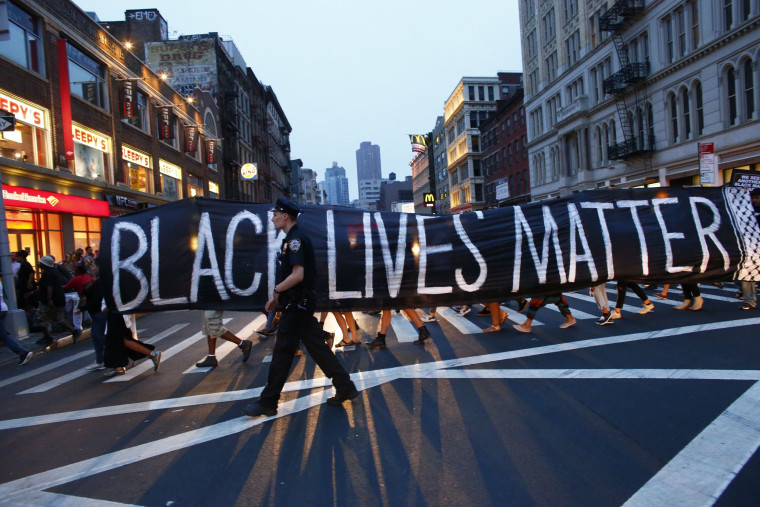It has been nearly two years since the killing of Michael Brown Jr. by a police officer in Ferguson, Missouri, touched off outrage and a national movement to save black lives from state violence. Now, just days ahead of the anniversary of Brown’s death, a coalition of organizations that grew from that uprising have launched a policy agenda calling for deep criminal justice and policing reforms.
The Movement for Black Lives — under the catch-all banner of the Black Lives Matter movement — has put together what it describes as a “clear vision of the world where black humanity and dignity is the reality.”
In the plan, titled "A Vision for Black Lives: Policy Demands for Black Power, Freedom and Justice,” dozens of established activist and advocacy groups joined forces to offer six core demands and 40 policy priorities.
Related: Black Lives Matter Organizer Kei Williams on Being Black and Trans in America
“Our grievances and solutions extend beyond the police killing of our people; state violence includes failing schools that criminalize our children, dwindling earning opportunities, wars on our trans and queer family that deny them of their humanity, and so much more,” Montague Simmons of Organization for Black Struggle and the Movement for Black Lives Policy Table, said in a statement. “That’s why we united, with a renewed energy and purpose, to put forth a shared vision of the world we want to live in.”
The six platform demands are:
1. End the war on black people.
2. Reparations for past and continuing harms.
3. Divestment from the institutions that criminalize, cage and harm black people; and investment in the education, health and safety of black people.
4. Economic justice for all and a reconstruction of the economy to ensure our communities have collective ownership, not merely access.
5. Community control of the laws, institutions and policies that most impact us.
6. Independent black political power and black self-determination in all areas of society.
To achieve those demands the group offered a set of solutions that include the demilitarization of police and an end to systemic attacks on black youth, including black members of the LGBTQ community. They call for the passing of state and federal laws that acknowledge and address the impacts of slavery and the passage of H.R. 40 to form a commission to study reparations proposals. Another of the recommendations calls for the “retroactive decriminalization and immediate release of all people convicted of drug offenses, sex work-related offenses and youth offenses.”
Related: Black Lives Matter Responds to Trump's 'Dog Whistle' Speech
“We recognize that not all of our collective needs and visions can be translated into policy, but we understand that policy change is one of many tactics necessary to move us towards the world we envision, a world where freedom and justice is the reality,” M. Adams, co-executive director of Freedom Inc., said.
Critics of the Black Lives Matter movement have lambasted the group for not having crafted any concrete demands or solutions. And while other groups under the broader BLM banner, including Campaign Zero, have articulated clear aims to end police violence against blacks, Monday’s release highlights the maturation of this leaderless movement into a more united front.
"As a Latina, as a progressive leader ... I’m not writing today to endorse this national platform,” said Jodeen Olguín-Tayler, vice president of policy and strategic partnerships for Demos Action. “The movement for black lives does not need my stamp of approval. Instead, I’m calling on other progressives — especially other light-skinned people of color, white people and leaders of the Democratic Party — to sit up and pay attention.”
The release comes just days after the close of the Democratic National Convention in Philadelphia, in which Democratic presidential nominee Hillary Clinton and party leaders crafted a relatively progressive party platform that includes a call for criminal justice reforms. Yet many black activists remain wary of Clinton, given policies enacted during President Bill Clinton’s administration that some say fueled a dramatic uptick in mass incarceration and the criminalization of black people.
The new Democratic platform follows the Republican National Convention, where Republican nominee Donald Trump proclaimed himself “the law and order candidate,” a not-so-veiled throwback to the Nixonian policies of the 1960s and '70s that worked to suppress social movements and quash efforts by African-Americans to fight racism and systemic oppression.
“We seek radical transformation, not reactionary reform,” Michaela Brown, communications director of Baltimore Bloc, said in a statement. “As the 2016 election continues, this platform provides us with a way to intervene with an agenda that resists state and corporate power, an opportunity to implement policies that truly value the safety and humanity of black lives, and an overall means to hold elected leaders accountable.”

